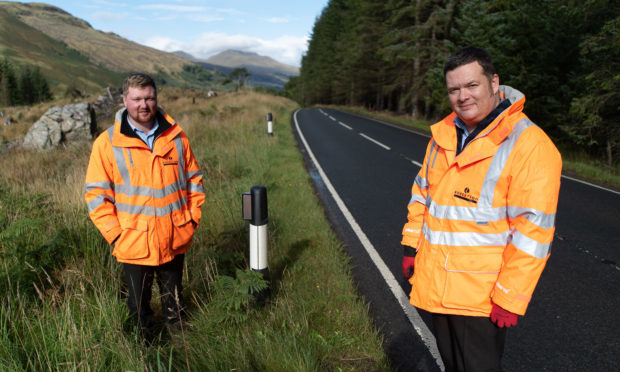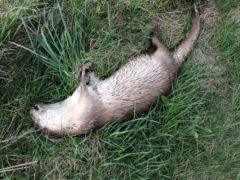An ingenious device to prevent roadkill on the A827 near Killin is being used to get more young people excited about engineering.
Engineers Bob Gould and Marc Anderson were so shocked by the image of a dead otter lying by the roadside, they developed a wildlife warning reflector to stop animals from stepping in front of approaching traffic.
Their work will now feature in a film to be shown in schools as part of Tomorrow’s Engineers Week, from November 5 to 9, which aims to recruit more young people into engineering, or encourage them into studying maths and sciences.
Mr Gould, 44, from construction firm Robertsons, said wildlife enthusiasts from Environmental Action Killin contacted him with the photo of the dead otter and asked what could be done to prevent it happening again.
“We were doing a biomass project up in Killin and were getting engaged with the community up there. They asked if we could help, and Robertsons put a high regard on social responsibility, so we were quite happy to get involved,” he said.
“We hadn’t done anything to protect otters before, but we thought it would a great way to do some good. When you see a photo of a dead otter – and they’re quite big – it puts a bit more context on it.”
The device – installed near the Acharn biomass facility, near Killin – works by reflecting the headlights of oncoming cars into the countryside. This in effect dazzles any approaching animal, including otters, making them stop until the light has gone. The driver remains unaware of the light.
He said it took them around a day to build and install the device, after a few months planning.
“The reflectors are angled in a certain way so when you’re driving along the road it sends the light 90 degrees out into the fields and scares them away. It’s a simple as that,” he added.
He said he hoped the film would show that engineering is about more than just building sites.
“It’s about different things that can help people. I’d like to think this will encourage some young people into thinking about a career in engineering.
“Now there’s been no reports to me of further otter deaths by car so I can only assume it has helped. Being a protected species, anything you do is a help to them.”
Rosie Third, 56, of Environmental Action Killin, said: “The guys were absolutely wonderful. I thought, right. I am going to do something about this and from the start they were positive and wanted to get involved.
“I didn’t know if they would think I was a crazy lady, but they took me seriously and did a really good job very quickly,” she added.











